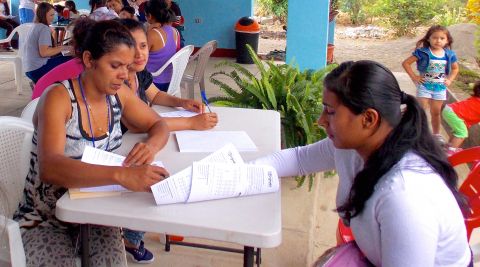
While driving home after meeting with community leaders about a new water project, community health worker Marta Eliza, program supervisor Yarisleidy and I discussed the challenges of being a woman in Latin America and a woman in the work force. In this case, each of us is both.
“A veces creo que se equivocaron conmigo.”
“Sometimes I think they got it wrong with me,” explained Marta Eliza, a community health worker from the rural community of Los Robles in Northern Nicaragua. Marta Eliza confessed that sometimes she thinks she was meant to be a man because she enjoys working – both in the physical sense of agricultural labor and in an office environment. She shared with us that she wakes up early, works all day and doesn’t mind; she is always looking for more ways to give back to her community. She is strong, both physically and emotionally. For these reasons, she wonders if she may have been better suited to be a man than a woman.
Despite my strong feminist convictions and educational formation, I didn’t quite know how to respond to Marta Eliza’s comments. I waited to see what Yarisleidy, a young professional Nicaraguan woman, would say. Her response nearly took the words out of my mouth. Yarisleidy expressed that being strong and driven has nothing to do with gender. She argued that men in the rural communities do work hard in agriculture for a full 8-hour day, but that women spend before, during, and after the workday caring for their house, children and husband. Often they tend their own garden and farm animals as well.
For a woman in the professional world, regardless of geographic location, sexism and discrimination are parts of everyday life. My female coworkers and I must confront machista statements and decisions on a daily basis. These acts of discrimination are not only perpetrated by men, and this phenomenon is certainly not limited to Latin America.
As the conversation with Marta Eliza and Yarisleidy continued, I had the opportunity to share with them how impressed and excited I am by the female leadership in both my organization and the communities in which we work. By the end of the drive, each of us had learned something new about each other and come to understand that despite cultural differences, we all have something in common. We are striving the increase equality among people – regardless of gender, age, life experience or nationality.
Marta Eliza will most likely never read The Feminine Mystique or attend a gender studies lecture. I will never thoroughly understand what it means to run a household in Los Robles. Through conversations such as these, she and I can connect and collaborate as a team – of strong, independent women – working to empower rural community members and especially young women to demand and show respect for themselves and those around them.
